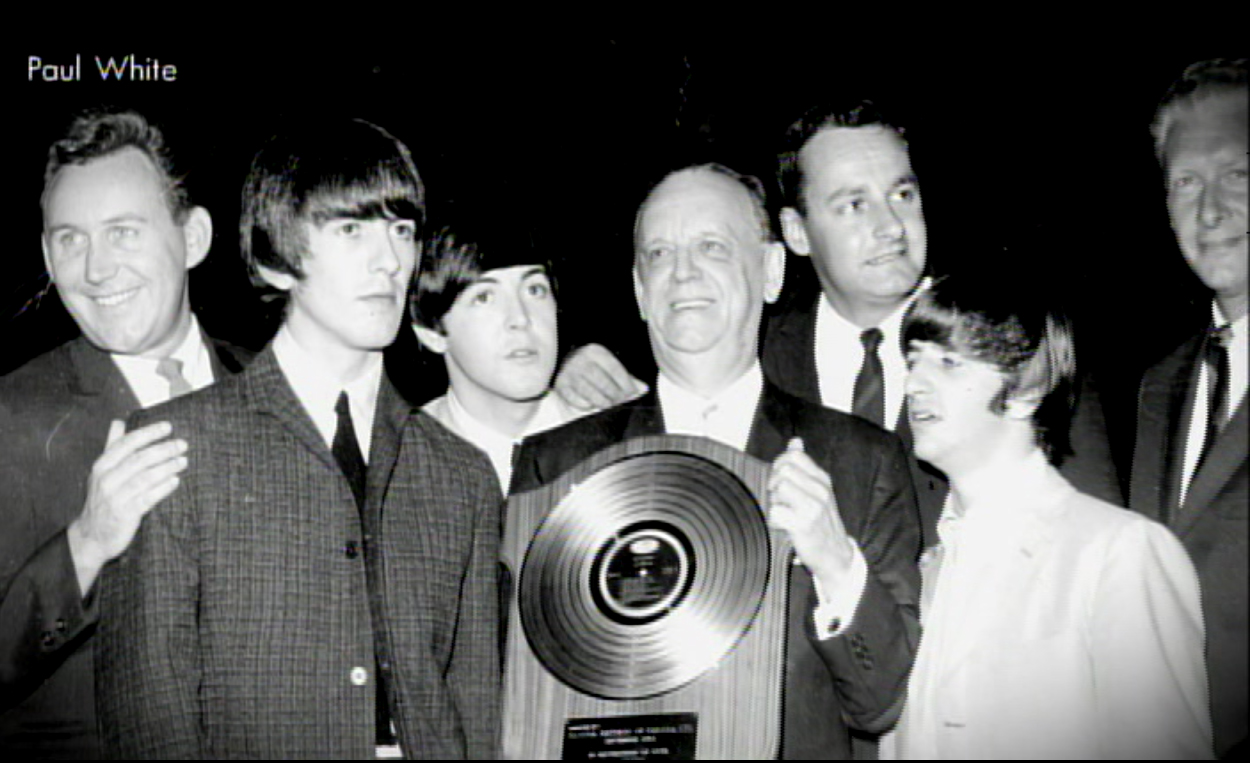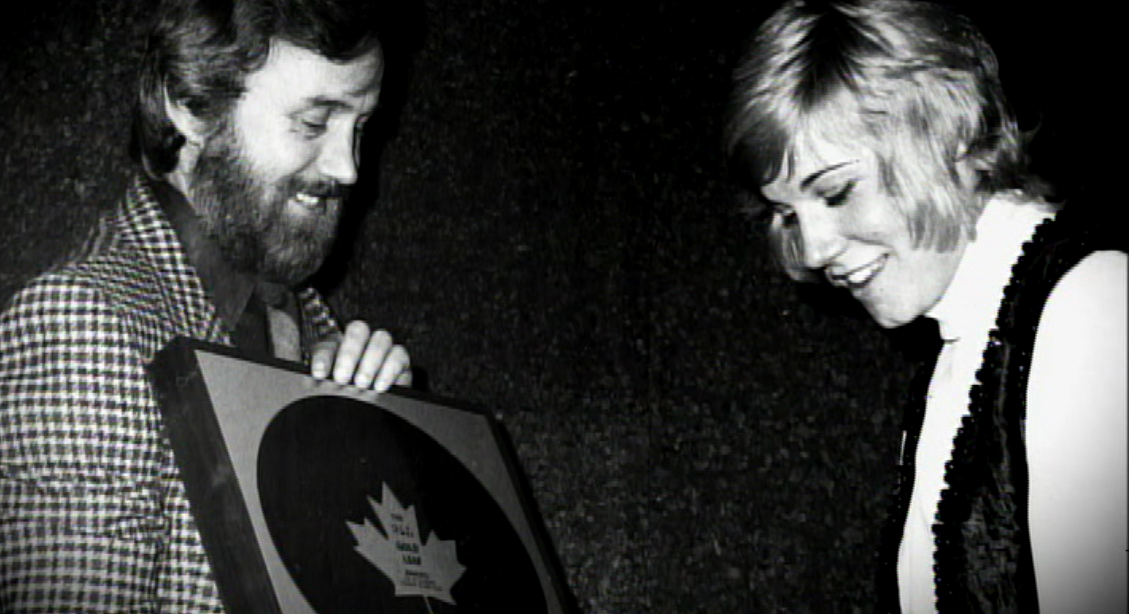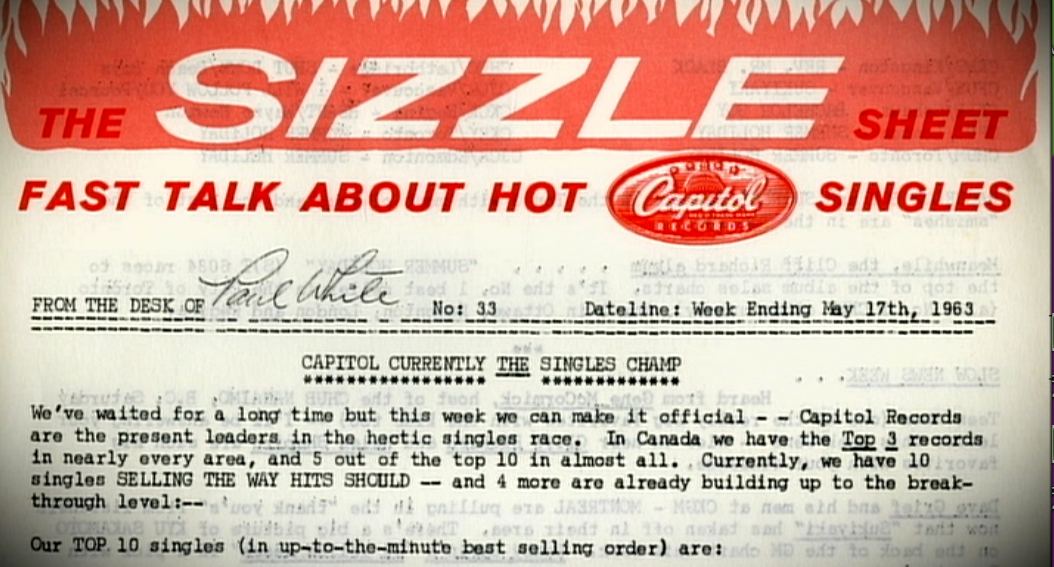Paul White behind his desk at Capitol Records Canada in 1972.
Paul White isn’t coy about his opinions on music. His achievements during his tenure at Capitol Records Canada from 1957-1978 are significant. He is credited for breaking The Beatles in Canada six months before the U.S., sparking Beatlemania in North America. He helped launch the career of Anne Murray, and he is responsible for the release of too many noteworthy Canadian albums to count throughout the ‘60s and ‘70s.
“I’ve always had an eclectic taste, but the only thing I’m not into is rap,” he confesses.
If you ask him about the Canadian bands that never got their due, he’ll tell you that Toronto’s The Ugly Ducklings were “just as good as The Rolling Stones,” and that Vancouver’s Mother Tuckers Yellow Duck “had interesting-looking press pictures,” but “didn’t quite make it.” Or that Bobby Curtola was “the first genuine Canadian pop star, who has never received the credit he deserved,” and Terry Black “was very good-looking” and “I thought, well ‘this guy’s gonna go far.'” He went so far that nobody ever heard of him again. (White’s line, not mine.)
“Times Are Changing” by Mother Tuckers Yellow Duck circa 1969.
Terry Black performing “Unless You Care” on American Bandstand in 1964.
White knows his music, and has been championing music in Canada since he fell into the business in 1957.
How a British expat ended up climbing his way to the top of the Canadian music industry ladder is another story altogether. So here it goes.
When White arrived in Canada from England in 1957, he was an out-of-work reporter with dreams of working at the Toronto Star or The Telegram.
“They politely told me that I had no experience in Canada, so why don’t I go off to the boondocks and get some experience?” White says. “I looked in The Telegram and there was a shipping job at Capitol Records. I thought, ‘What’s a shipper?’, because in England they’re called warehouse men. I went down there, and there was about 75 people all going for two jobs. I got the job simply because I had references, and the guy that was interviewing me thought it was so funny that there was going to be a shipper who brought references with him. He took a chance on me. The next day I forgot where the place was and almost lost the job.”
White worked his way from the stock room, sorting through heaps of 78s and 45s, then moved onto the order desk, and then onto promotions after UK-based EMI bought Capitol (U.S.)—a merger that allowed for more autonomy for the label’s Canadian operations.
Using a one-page hype sheet, dubbed the Sizzle Sheet—an innovation created by White to help push singles, and later LPs, which eventually expanded to two pages—the young promotions manager started to get influencers from across the country to play Capitol releases and promote their artists.
Capitol Records Canada’s Sizzle Sheet from 1963.
“I faithfully did it every week,” he says. “I sent it to every radio station and every program director and every entertainment reporter at every paper I could think of, and I got them all working against each other in radio. I would tell Red Robinson in Vancouver that CHUM in Toronto was playing Cliff Richard, and then I would tell CHUM that Red Robinson was playing The Yardbirds and I started to get a lot of feedback from them, and I kept that going for years.”
Cliff Richard, Britain’s answer to Elvis Presley, was hugely popular in Canada in the ’60s. As White says, “he was so popular I could have released a new album by him every day.”
The Yardbirds’ eponymous 1965 hit “For Your Love.”
As part of the first A&R division in Canada, White also established the Capitol 6000 series, which became very popular among collectors. Initially targeted towards the “average Canadian,” the series helped promote already established artists from England, including easy-listening chart-toppers from the ’60s, including Matt Monro, Helen Shapiro, Frank Ifield, and The Shadows, and later diversified to include British Invasion acts and all genres of Canadian content.
Long days spent scouring through new releases, trying to determine which records to put out and which ones to trash was a common routine for White. After everyone had left for the evening, he would turn up the volume on the stereo, and listen to all of the singles that had just come in from EMI in England.
When he happened upon a group of newcomers from Liverpool, called The Beatles, he was intrigued, but not in the earth-shattering way that one might expect.
“I had a pile that was for ‘yes, I’m going to release that,’ ‘maybe’ and ‘no,’” says White. “I had just listened to a lot of crap, and then I got to The Beatles’ ‘Love Me Do.’ I thought ‘Oh, these guys aren’t too bad.’ Not the best lyrics I’ve ever heard, but there was something so simple about it. I put it in the ‘maybe’ pile and thought, ‘Well, let’s just go with it.’ I just released it on a whim, because I thought they really had something.”
The Beatles’ “Love Me Do” was a flop when it was first released in Canada, despite climbing the charts in the U.K.
The record, “Love Me Do,” was a flop. It sold a mere 150 copies, and radio stations refused to play the single. Despite the initial lackluster response, White released several more Beatles’ singles, “Please, Please Me” and “From Me to You,” which saw slight improvements in sales.
“Then ‘She Loves You’ hit and all hell broke loose,” says White. “It was the first time that CHUM Toronto, which was a big station, went on them. Then, of course, they claimed that they had discovered The Beatles, but CHUM used to do that. It was a little station in Oshawa that actually discovered them. They were the first ones to play a Beatles record in Canada.”
“She Loves You” was the first Beatles single that caught on in North America.
It was late 1963, and Beatlemania in North America had just begun. White’s foresight had stirred on the biggest musical craze the country had ever seen.
 Paul White and fellow Capitol Records Canada executives presenting The Beatles with a Gold-certified record at their Maple Leaf Gardens concert in 1964.
Paul White and fellow Capitol Records Canada executives presenting The Beatles with a Gold-certified record at their Maple Leaf Gardens concert in 1964.
“I had salesmen jumping down my throat, saying ‘Let’s get the album out! Let’s get the album out!,’” White says. “I phoned EMI, and they sent over the master tapes first class the next day on a plane, and we had 25,000 copies printed up in two days…we had sold 50,000 copies in the first couple of weeks.”
With the rise of British Invasion acts, like The Beatles, Manfred Mann and The Rolling Stones, the ‘60s became a lucrative time for the Canadian music industry, but not so much for Canadian artists.
“Capitol Canada became very rich, so I suddenly had budgets to sign groups,” he says. “Unfortunately the Capitol sales groups got in a state of inertia, because they didn’t have to go out and sell The Beatles or Gerry and the Pacemakers or The Animals or Herman’s Hermits to dealers. You could just walk in and get orders right away. But release an album by The Staccatos and ‘Hey, I’ve got to do some work here.’”
“Half Past Midnight” by Ottawa’s The Staccatos, released in 1967.
Despite the industry’s reluctance to support its own artists, regional hotbeds across the country continued to churn out high-calibre talent. Whether the vast majority knew it or not, the Canadian music scene during the ‘60s was thriving.
“Toronto’s Yorkville scene, Ottawa, Edmonton and Winnipeg were the four biggies,” says White. “The Canadian music scene and its musicians were dynamic, especially Yorkville in Toronto. A lot of Americans were draft dodgers, and a lot of good musicians came up here. They mingled with the local musicians, and you had this hotbed of talent. I mean, my god, when you think about the Riverboat Club that had all of the folk singers. Walking through Yorkville in the ‘60s was so energizing. There were coffee shops right next to each other—all of them chock a block full. You ran over to Avenue Road and you’d see a rock group doing experimental things…I don’t want to sound like I’m so Torontonian, but Toronto in the ‘60s sort of had it. It was where you had to be. You could go down Yonge Street and there was Ronnie Hawkins playing in the clubs. It was just an amazing time.”
During his first few years as an A&R manager, White made deals with Toronto’s Ronnie Hawkins, The Ugly Ducklings, and David Clayton-Thomas for his anti-war single “Brainwashed,” which climbed the Canadian charts in the summer of ’66, along with The Sugar Shoppe, who went straight to an American deal with Capitol’s U.S. leg.
David Clayton-Thomas’ 1966 anti-war single “Brainwashed.”
The Ugly Ducklings’ first single “Nothin’” from 1966. The garage rock band, who were heavily influenced by The Rolling Stones, later became Mick Jagger’s “favourite Canadian band.”
The Sugar Shoppe’s 1968 song “Skip A Long Sam.”
He also signed The Esquires and The Staccatos from Ottawa, along with Alberta’s Wes Dakus and Barry Allen, who, White says was “the first Canadian Capitol artist to have a real Canadian hit” with “Lovedrops,” which was #1 on CHUM.
The Esquires’ 1964 ballad “Tragedy.”
When the A&R reps in Quebec couldn’t deliver enough local content, White deliberately signed the biggest star in the province to send a message: Quebec artists sell records, so work harder.
Pierre Lalonde singing his 1971 hit “Attention, la vie est courte.”
“Pierre Lalonde was huge in Quebec,” says White. “I gave him a huge advance to leave Trans-Canada records, and come to Capitol. The only way that I could attract other French-Canadian artists, and for them to see that Capitol Records meant business, was to sign a big star…and that’s when we eventually signed Beau Dommage, who became monsters down there.”
Quebec folk-rock group Beau Dommage performing “Un incident à Bois-des-Fillon” in 1975.
In the early years of the A&R division, White wore two hats, acting as both the promotions manager and A&R manager. Working with limited budgets, he used out-of-town visits to radio stations as opportunities to find new talent, and even looked to popular variety programs on CBC or CFTO (now called CTV) to discover artists without having to travel.
“I saw Anne Murray on Singalong Jubilee and I watched it for a few weeks,” says White. “What I liked about her was that she was so completely natural with this guitar slung up in front of her and no shoes, and a voice that I just couldn’t believe. I mean, I just fell in love with that voice.”
Though Murray was already signed to another label, called Arc Records, an agreement was made to get her out of the contract early.
White signed Murray to a five-year deal with Capitol Records, and released her multi-million selling album, This Way Is My Way, featuring the international hit “Snowbird.”
And the rest is history.
 Paul White presenting Anne Murray with an RPM Gold Leaf Award for “Snowbird” in 1970.
Paul White presenting Anne Murray with an RPM Gold Leaf Award for “Snowbird” in 1970.
White would release many more iconic albums with Murray. Even today, he still recalls hearing the playback of “You Needed Me” off her 1978 album Let’s Keep it that Way for the first time with Murray and producer Jim Ed Norman.
“When the strings started on “You Needed Me,” you could feel a shiver going down all of our spines, and you knew one of the reasons you’re in the business is because of days like this,” he says. “We just turned and looked at each other and said ‘Jesus!’”
Anne Murray performing her spine-tingling hit “You Needed Me” on Johnny Cash’s 1979 Christmas Special.
Anne Murray became a household name in both Canada and the U.S., paving the way for other Canadian artists, and helping to put Canada on the international map.
“That was the lesson that the industry still had to learn, because they still didn’t want to go out and work hard to push Canadian artists,” White says. “I would always be pushing new Canadian artists. It wasn’t until Anne Murray that they all realized that they could sell Canadian artists, and it wasn’t just Capitol Records, it was the whole industry. It was very strange, but that’s certainly changed over the years.”
— Julijana Capone
